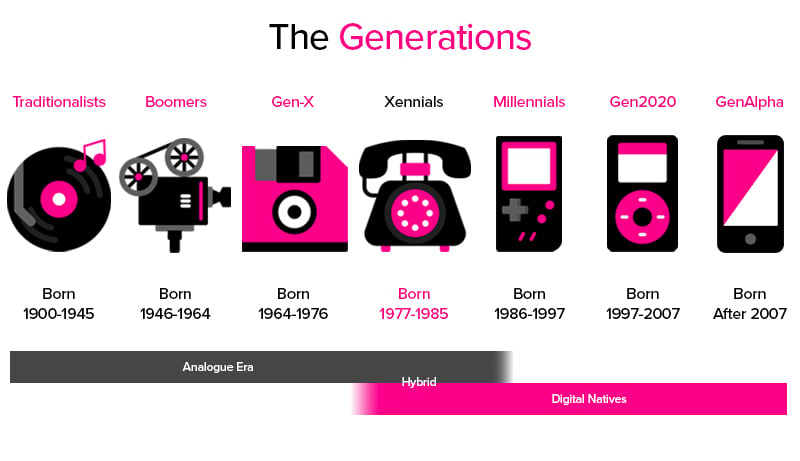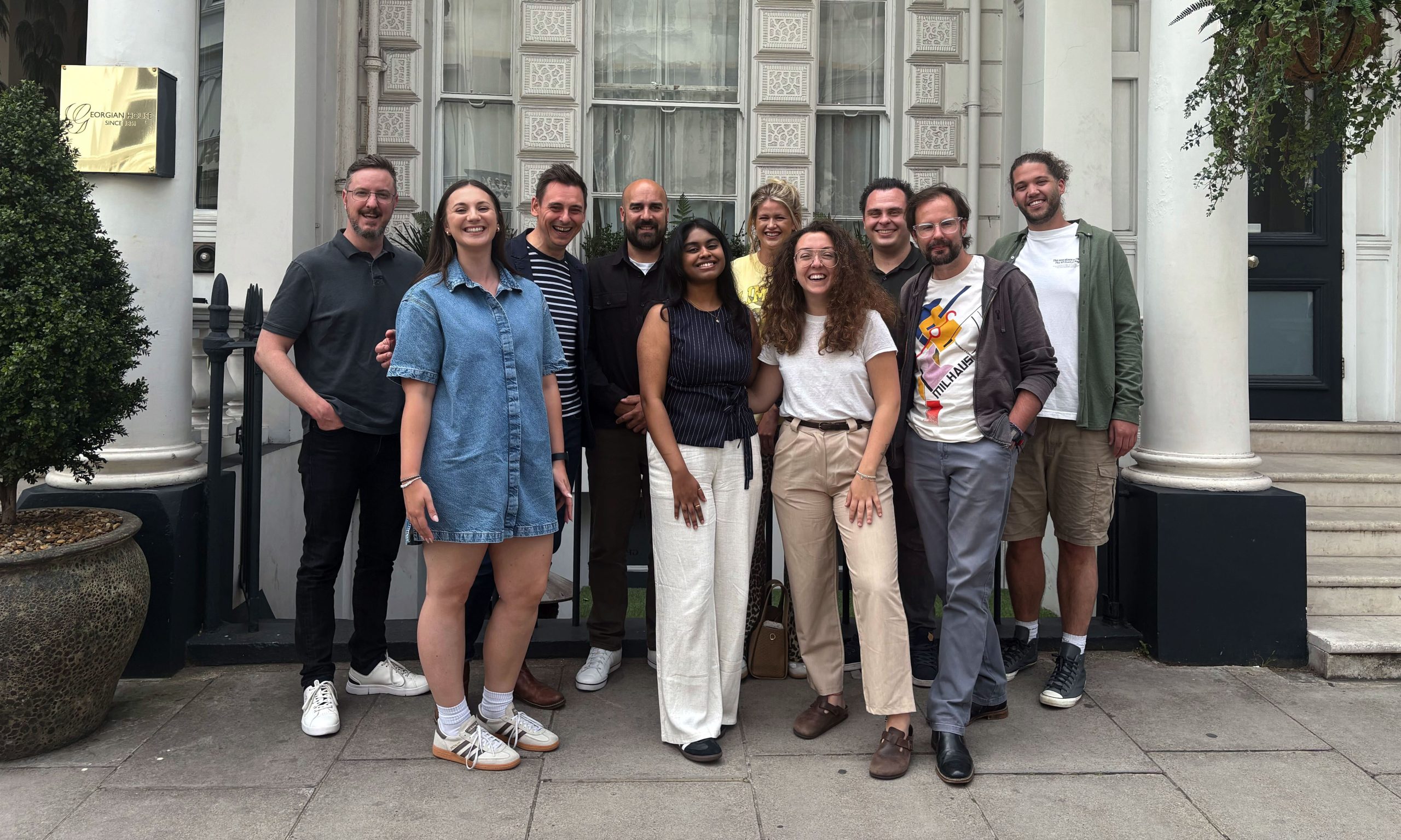
As we hurtle towards the end of another year, it’s common practice for people to become reflective, almost nostalgic, especially when the new year brings with it a new decade – welcome to 2020. That’s right. Twenty Twenty. 20 years ago, it was the year 2000! When I think of 20 years ago, I think of 1980. And thats the thing with my generation – Xennials – our view of the past 20 years is incredibly interesting and features an absolute plethora of technological change and advancement. But what has this got to do with marketing? Bear with me on this one. It’s going to be an interesting journey.
What is a Xennial?
Firstly, let’s just clarify what we mean by the term Xennials. Born during the release of the original Star Wars trilogy, Xennials are people sandwiched somewhere between Gen-X and Millennials, typically born between 1977 and 1983. Often considered less cynical and pessimistic than Gen-X (defined as being born from the mid 1960s to early 1980s), but not as optimistic or ‘entitled’ as Gen-Y (born from the early 1980s to late 1990s). With this, Millennials are said to be born between 1981-2004. So, being born in 1984 means my personal generational experience spans across these age brackets, and it’s fair to say this leaves me as somewhat of a Xennial.
This generation, in essence, has experienced an analogue childhood and a digital adulthood. They were there for the transition from blackboards & chalk to whiteboards & dry-erase markers (way before interactive whiteboards were a thing). Floppy disks? Many will remember loading up Microsoft Windows 95 on one of those (well, actually, it was about 35 of them!), or listening to music on vinyl and cassette. Then CDs came along and blew minds (both for audio and data), before the ill-fated Mini-Disc, and the very first MP3 players during their adolescence. Likely to still have a Hotmail account and to have owned the original Game Boy portable gaming console, they remember a childhood of playing outside in the street with friends; they also remember dial-up internet and brick-like mobile phones (or even telephone boxes and paycards). Xennials are likely to shop both on and offline in equal measure, often browsing via e-commerce yet still preferring to ‘try stuff on’ and experience the touchpoint of a physical retail store. They’re also young enough to be the first to truly embrace the first wave of social media (via a brief foray in the land of MSN Messenger – the origin of the emoticon aka emoji!) in their teens and twenties, choosing to share their life experiences on Facebook, Twitter and Instagram, but being wary of TikTok and the newer kids on the block.
As a result of this, technologically, Xennials are the ‘best of both worlds’.
Growing up through emerging technologies, they are fluent in modern digital culture, but they aren’t chained to it and have some ability (or at least a latent space in their brains) to unplug and detach, to appreciate the analogue side of today’s digital world.
Economically, Xennials “have seen it all”. They are old enough to remember the end of a long period of growth (following a small recession) in the 1980s-90s, but they came of age around the time that the “dot-com bubble” burst and saw the decline and major recession of the 2000s. In other words, they were given a taste of the good life, prior to being brought down a peg or two (with recession and austerity hitting just as they were entering an increasingly competitive job market).
But how does this impact those of us in this bracket in a marketing sense, and are there any advantages to this generation’s marketing specialists?
Xennials are driving much of today’s Marketing delivery:
The light-bulb moment which triggered this whole article was actually when I was sat in traffic. I drive a car with a DAB radio, which is fantastic for digital sound quality and choice of stations. However, as soon as you’re in an area with poor signal (often in town centres), rather than the radio going a bit fuzzy with that classic sound of white noise for a few milliseconds (a-la analogue FM radio), it cuts out completely in total silence and scrambles to find the next digital signal. This epitomised, to me, the world we’re living in. Digital solutions which are somewhat binary. It’s often either on or off, with no fuzzy in-between. Which is superior in many ways, until a battery dies, a cable is cut, or you lose signal. This disconnect often leaves those solely reliant on digital lacking. In this scenario, in these areas of poor digital signal, I usually revert to good old analogue radio.
This analogy explains my point about Xennial marketers perfectly – the ability to adapt, understand and embrace both Digital and Analogue verticals, channels and media when it’s relevant and optimal to do so.
This ability to work across digital and analogue channels gives Xennial marketers an advantage in terms of their omni-channel understanding, particularly when looking further up the marketing funnel. Their understanding of the importance for awareness-building through offline brand campaigns, often to support an online digital campaign is of huge value. This engineered hybrid of analogue and digital mindsets, as well as an understanding of the commercial environment through the ages (both prosperity and austerity) adds a depth of experience both the older and younger generations may lack.
Xennials have lived through the information age:
Of course, diversity is key:
As with any Team, generational diversity is absolutely key, particularly in an agency setting. The ability to adapt to the huge range of client types, industries, B2B vs B2C audiences, and differing levels of commerciality is a huge advantage in this space (thankfully one we have at Wonderful!). Getting the right blend of these cross-generational omni-channel-thinkers, with a sprinkling of Boomers, Gen-X, Gen-Y and Millennials, is a fantastic way of ensuring all avenues are considered when developing campaigns and marketing strategy for businesses. Our collaborative approach ensures we explore a vast array of options and creative strategies before committing to the ‘right’ one we, as a team, believe will truly deliver lasting change for the client.
Latest posts

The Wonderful Creative Agency enters new era as an employee-owned business
Award-winning creative agency transitions to employee ownership with Dan and Claire Maudhub selling majority stake